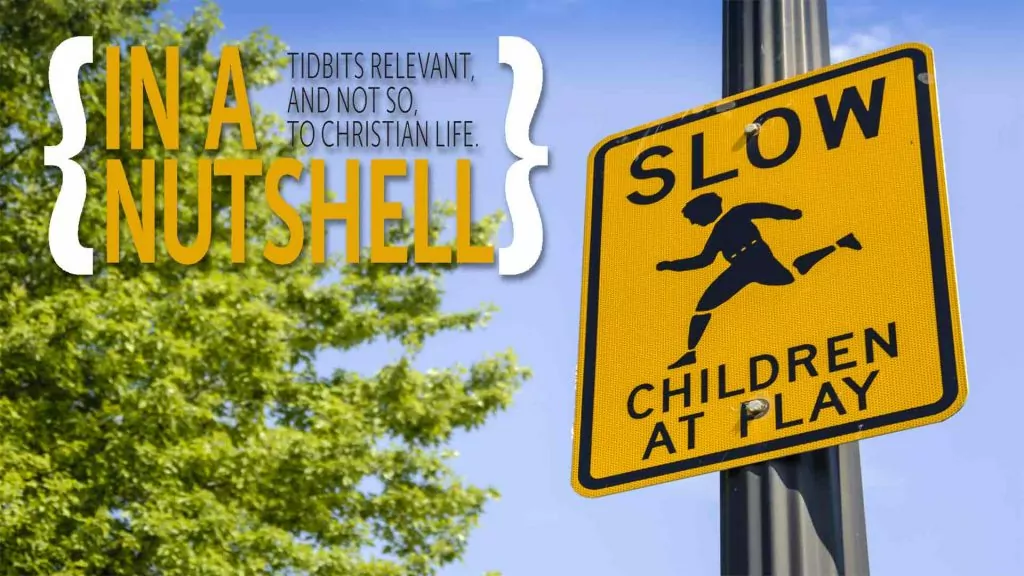Great Communicator on communication and diaper changes
Ronald Reagan was nicknamed “The Great Communicator” for his ability to connect with his listening audience. But that wasn’t something he was just born with – he thought a lot about it, as evidenced in this joke he told.
I’ve always thought of the importance of communication and how much a part it plays in what you and I what all of us are trying to do. One day…a sports announcer, Danny Villanueva, told me about communication. He said he’d been having dinner over at the home of a young ball player with the Dodgers. The young wife was bustling about getting the dinner ready, they were talking sports, and the baby started to cry. Over her shoulder, his busy wife said to the ball player, “Change the baby.”
Well, he was a young fellow, and he was embarrassed in front of Danny. He said, “What do you mean change the baby? I’m a ballplayer; that’s not my line of work.”
Well, she turned around, put her hands on her hips and she communicated.
She said, “Look buster, you lay the diaper out like a diamond, you put second base on home plate, you put the baby’s bottom on the pitcher’s mound, you hook up first and third, slide home underneath. And if it starts to rain, the game ain’t called; you just start all over!”
God can use even a stolen book …
A former homosexual, Rachel Gilson, recently explained how God turned her around. The author of Born Again This Way: Coming Out, Coming to Faith, and What Comes Next, shared that it began with her girlfriend dumping her for a guy who was basically homeless, living in his van. Then at an acquaintance’s house, a non-practicing Catholic, she noticed a bookshelf.
“…and one of my favorite hobbies is to look at people’s bookshelves and judge them, you know? So, I’m checking it out, looking up and down. And there was a copy – there was a book on this shelf. The spine read Mere Christianity by C.S. Lewis, and so I thought, ‘Oh, I really want to read that book,’ but I was too embarrassed to ask my friend for it. So, I just stole the book because, again, I had no moral code, right?…. So, I was sitting in the library soon after that, reading Mere Christianity, and while I was reading it one day, I was just overwhelmed with the realization that God exists….. I was just overwhelmed with the reality of God. And not like a store brand, you know, like Zeus or something, but the God who made me and who made everything and who was perfect. It was like I could sense God’s holiness even though I didn’t know that vocabulary and the only thing I felt was fear. I’m arrogant. I’m cruel. I’m sexually immoral. I lie. I cheat. I’m reading a stolen book. It’s clear all of the chips are in the guilty category, right? I had no confusion at that moment either, but really quickly with that I also understood that part of the reason Jesus had come was to place Himself as a barrier between God’s wrath and me. And that the only way to be safe was to run towards Him, not away from Him.
SOURCE: John Stonestreet’s “On being saved from confusion: the testimony of Rachel Gilson” posted to Breakpoint.org on June 10, 2022.
Gratitude lurking…
In his autobiography, G.K. Chesterton expressed how even in the depths of despair, a man might not be so far from optimism. Though there is a chasm between the two, the bridge over is that of amazement, leading to gratitude.
“No man knows how much he is an optimist, even when he calls himself a pessimist, because he has not really measured the depths of his debt to whatever created him and enabled him to call himself anything. At the back of our brains, so to speak, there [is] a forgotten blaze or burst of astonishment at our own existence. The object of the artistic and spiritual life [is] to dig for this submerged sunrise of wonder; so that a man sitting in a chair might suddenly understand that he [is] actually alive, and be happy.”
The Journalist
In the past, he had to “pay dues”
And develop “a nose for the news.”
Well, he still has a nose,
But, my, how it grows
When the facts must conform to his views.
– F.R. Duplantier (used with permission)
Forgiving vs. excusing
“I find that when I think I am asking God to forgive me I am often in reality…asking Him not to forgive me but to excuse me. But there is all the difference in the world between forgiving and excusing. Forgiveness says ‘Yes, you have done this thing, but I accept your apology. I will never hold it against you and everything between us two will be exactly as it was before.’ But excusing says ‘I see that you couldn’t help it or didn’t mean it; you weren’t really to blame.’ If one was not really to blame then there is nothing to forgive. In that sense, forgiveness and excusing are almost opposites….When it comes to a question of our forgiving other people, it is partly the same and partly different. It is the same because, here also, forgiving does not mean excusing. Many people seem to think it does. They think that if you ask them to forgive someone who has cheated or bullied them you are trying to make out that there was really no cheating or no bullying. But if that were so, there would be nothing to forgive. They keep on replying, “But I tell you the man broke a most solemn promise.” Exactly: that is precisely what you have to forgive. (This doesn’t mean that you must necessarily believe his next promise. It does mean that you must make every effort to kill every taste of resentment in your own heart – every wish to humiliate or hurt him or to pay him out.) The difference between this situation and the one in which you are asking God’s forgiveness is this. In our own case we accept excuses too easily; in other people’s we do not accept them easily enough.”
– C.S. Lewis in The Weight of Glory
10 reasons English is a silly language
Homophones – words that sound alike but have different meanings – are unique to the English language, but we have an awful lot of them. In looking at the examples below, I felt like I almost saw the thread of a story moving from one sentence to the next. If an aspiring student wants to try to make a coherent story using as many of these homophones as possible, please send it on in. You can reach the editor via our contact form.
1) The bandage was wound around the wound.
2) The farm was used to produce produce.
3) The soldier decided to desert his dessert in the desert.
4) A weak spring means I have wind my wind gauge once a week.
5) When shot at, the dove dove into the bushes.
6) Excuse me but there’s no excuse for this.
7) I need to read what I read again.
8) Wait just a minute – that’s making a mountain of something minute!
9) I object to that object and I’m not content with this content.
10) As there’s no time like the present, they’re going to present their present.
SOURCE: here and there on the Internet
Marriage matters materially
“What do you think distinguishes the high and low poverty populations? The only statistical distinction in both the Black and White populations is marriage. There is far less poverty in married-couple families, where presumably at least one of the spouses is employed.”
– Economist Walter Williams (1936-2020)
Someone wants you to talk
Many a famous quote can’t be traced back to the person who was supposed to have said it. Here’s three of just that sort, the first two likely not said by who there are attributed to, while the third remains a maybe. So why pass them on? Well, after reading these three on the problem with silence you’re going to feel challenged to speak… even if you don’t know who exactly issued the challenge.
- “If I profess with the loudest voice and clearest exposition every portion of the truth of God except precisely that little point which the world and the devil are at that moment attacking, I am not confessing Christ however boldly I may be professing Christ. Where the battle rages there the loyalty of the soldier is proved; and to be steady on all the battlefield besides is mere flight and disgrace if he flinches at that point.” – attributed, almost certainly falsely, to Martin Luther
- Silence in the face of evil is itself evil. God will not hold us guiltless. Not to speak is to speak. Not to act is to act. – attributed to, but probably not by, Dietrich Bonhoeffer
- “When principles that run against your deepest convictions begin to win the day, then battle is your calling, and peace has become your sin; you must, at the price of dearest peace, lay your convictions bare before friend and enemy, with all the fire of your faith.” – credited to Abraham Kuyper (and it may be so)
A law even a libertarian could love
“Even many of us who believe in free enterprise have fallen into the habit of saying when something goes wrong: ‘There ought to be a law.’ Sometimes I think there ought to be a law against saying there ought to be a law.
– Ronald Reagan












